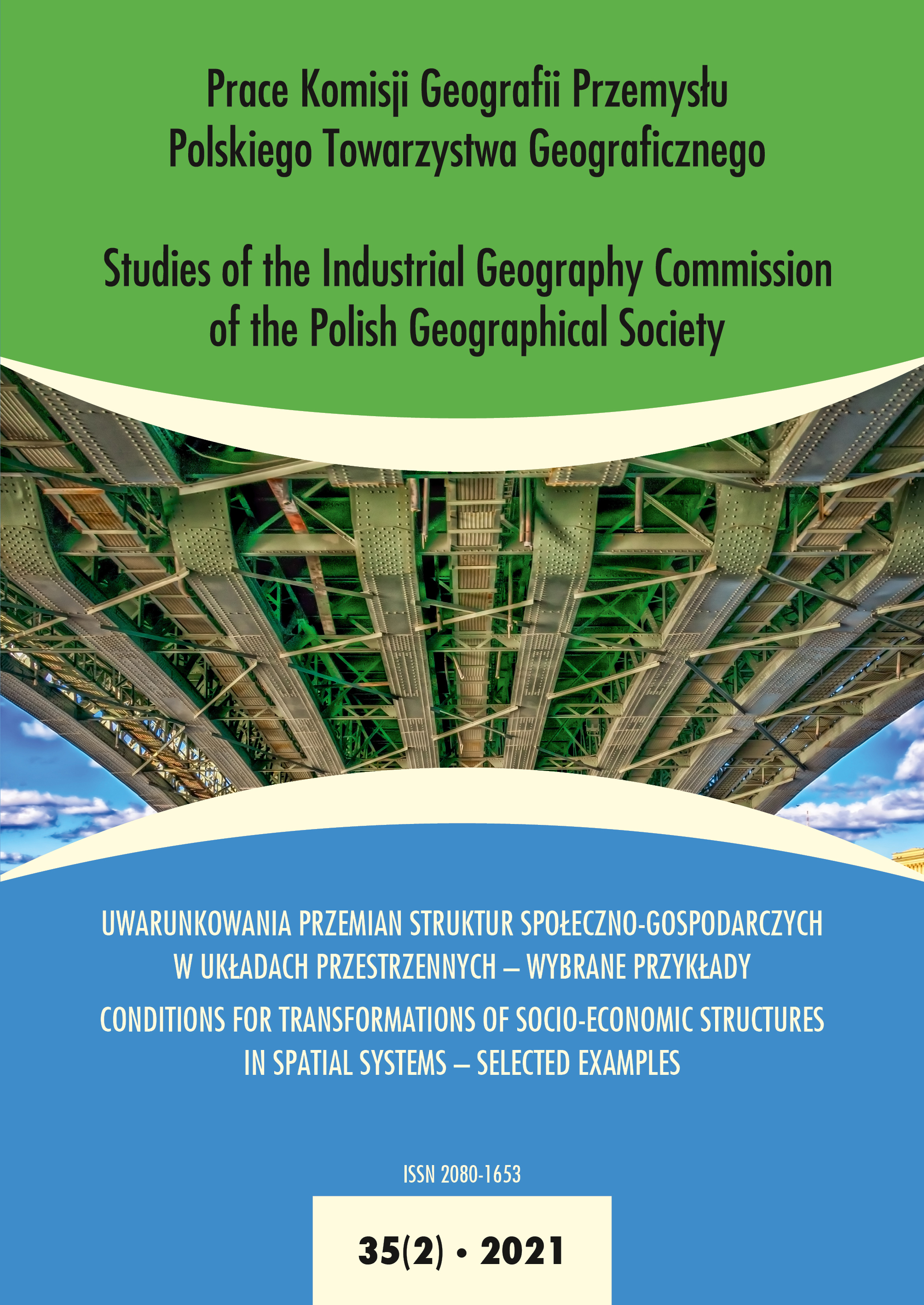Specificity of innovation in the service sector: the example of Poland
DOI:
https://doi.org/10.24917/20801653.352.2Keywords:
innovativeness, organisational innovation, Poland, service sectorAbstract
The discussion that has taken place in recent years on innovativeness in services is connected, on one side, with their growing role in the economy. On the other, it results from an increase in innovation as the main socio-economic development factor of countries and regions. Innovation is seen as an essential link in developing a strong economy, and its shortcomings may lead to an economic crisis. Innovations have become a new element playing a crucial role in crystallising a new economic model, particularly in developed countries. The growing role of services in the modern economy has led to an increased interest in service activities and service innovations. This paper aims to present the specificity of innovations in the service sector compared to the manufacturing industry based on Poland’s example. In the empirical analysis, data from the Central Statistical Office in Poland and EUROSTAT was used. An analysis of innovativeness in the service sector, based on traditional innovation measurement indicators, concludes that it is much lower than in the manufacturing industry. In the entire analysed period, the percentage of innovative enterprises in the service sector was lower than in the manufacturing industry by several percentage points. According to service sector type, organisation and marketing are more critical in terms of innovation. In their cases, the differences between manufacturing and services are minimal; however, it is more significant in products and processes.
Downloads
Metrics
References
Bernardt, Y. (2000). De innovativiteit van de Nederlandse dienstensector. EIM Business & Policy Research. Zoetermeer.
Churski, P., Dolata, M., Dominiak, J., Hauke, J., Herodowicz, T., Konecka-Szydłowska, B., Nowak, A., Perdał, R., Woźniak, M. (2018). Współczesne przemiany czynników rozwoju społeczno-gospodarczego. Studia Komitetu Przestrzennego Zagospodarowania Kraju PAN, 183, 67–88.
Coombs, R., Miles, I. (2000). Innovation, measurement and services: the new problematique. In: J.S. Metcalfe, I. Miles (eds.), Innovation Systems in the Service Economy, Measurement and Case Study Analysis. Boston: Kluwer Academic Publishers, 85–103.
De Jong, J.P.J., Bruins, A., Dolfsma, W., Meijaard, J. (2003). Innovation in Service Firms Explored, What, How and Why? Strategic Study B200205. EJM Business & Policy Research. Zoetermeer
Dominiak, J. (2019). Nowoczesne usługi w ujęciu przestrzennym i ich rola w rozwoju społeczno-gospodarczym. Poznań: Bogucki Wydawnictwo Naukowe.
Drejer, I. (2003). Identifying innovation in surveys of services. A Schumpeterian perspective. Research Policy, 33(3), 551–562.
Felipe, J., Leon-Ledesma M., Lanzafame, M., Estrada, G. (2007). Sectoral Engines of Growth in Developing Asia. Stylised Facts and Implications. ERD Working Paper. Series 107. Asian Development Bank.
Gallouj, F., Weinstein, O. (1997). Innovation in services. Research Policy, 26(4–5), 537–556.
GUS. (2018). Działalność innowacyjna przedsiębiorstw w latach... Retrieved from https://stat.gov.pl/obszary-tematyczne/nauka-i-technika-spoleczenstwo-informacyjne/nauka-i-technika/dzialalnosc-innowacyjna-przedsiebiorstw-w-latach-2017-2019,2,18.html (Accessed on 18.03.2021).
Hausman, A., Johnston, W.J. (2014). The role of innovation in driving the economy. Lessons from the global financial crisis. Journal of Business Research, 67(1), 2720–2726
Hertog, P., Bilderbeek, R. (1999). Conceptualising Service Innovation and Service Innovation Patterns. Research Programme on Innovation in Services (SIID) for the Ministry of Economic Affairs. Utrecht. Retrieved from https://citeseerx.ist.psu.edu/viewdoc/download?doi=10.1.1.102.9390&rep=rep1&type=pdf (Accessed on 25.01.2021)
Hertog, P. (2002). Co-producers of innovation: on the role of knowledge-intensive business services in innovation. In: J. Gadrey, F. Gallouj (eds.), Productivity, innovation and knowledge in services. Cheltenham: Edward Elgar, 223–255.
Kowalski, M.A. (2011). Wpływ kryzysu gospodarczego na procesy współpracy i konkurencji. Master of Business Administration, 19(2), 30–42.
Miles, I. (2000). Services innovation. Coming of age in the knowledge-based economy, International Journal of Innovation Management, 4(4), 371–389.
Niedzielski, P., Rychlik, K., Markiewicz, J. (2008). Innowacyjność przedsiębiorstw sektora usług – nowe ścieżki rozwoju. In: Konkurencyjność, wiedza, innowacje. Polska na tle Europy i współczesnych wyzwań rozwojowych. Warszawa: UW.
Rodrik, D. (2009). Growth after the crisis. Working Paper 65, Washington: Commission on Growth and Development.
Tokarz, A. (2009). Zasoby ludzkie jako determinanta innowacyjności przedsiębiorstw usługowych. Materiały z konferencji Zarządzanie organizacjami usługowymi, Poznań. Retrieved from http://www.uslugi.ue.poznan.pl/file/129_462938426.doc (Accessed on 12.04.2011).
Downloads
Published
How to Cite
Issue
Section
License
Articles are published under the terms of the Creative Commons License (CC BY-ND 4.0; Attribution– NoDerivs).

